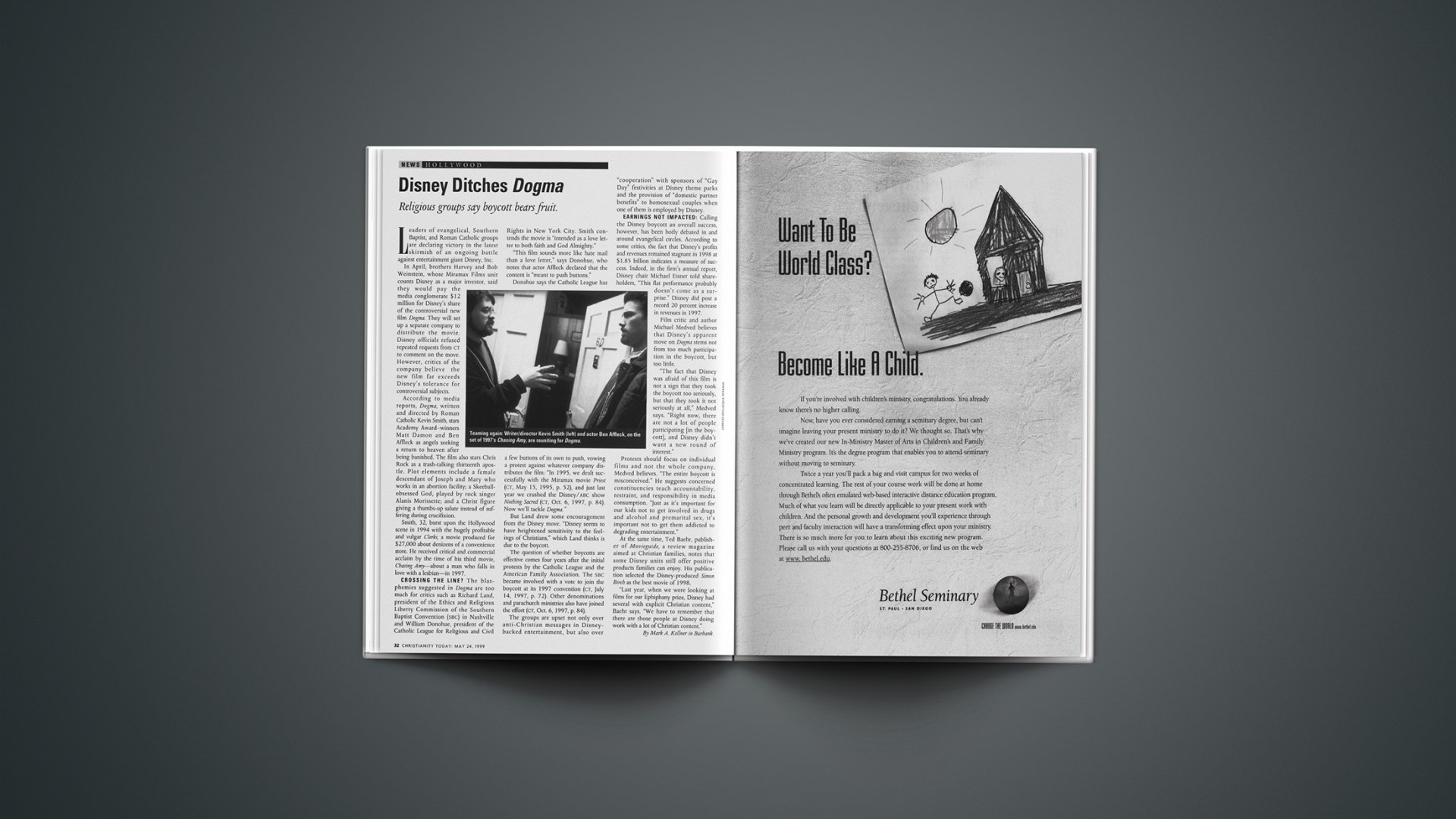Leaders of evangelical, Southern Baptist, and Roman Catholic groups are declaring victory in the latest skirmish of an ongoing battle against entertainment giant Disney, Inc.
In April, brothers Harvey and Bob Weinstein, whose Miramax Films unit counts Disney as a major investor, said they would pay the media conglomerate $12 million for Disney’s share of the controversial new film Dogma. They will set up a separate company to distribute the movie. Disney officials refused repeated requests from CT to comment on the move. How ever, critics of the company believe the new film far exceeds Disney’s tolerance for controversial subjects.
According to media reports, Dogma, written and directed by Roman Catholic Kevin Smith, stars Academy Awardwinners Matt Damon and Ben Affleck as angels seeking a return to heaven after being banished. The film also stars Chris Rock as a trash-talking thirteenth apostle. Plot elements include a female descendant of Joseph and Mary who works in an abortion facility; a Skeeball-obsessed God, played by rock singer Alanis Morissette; and a Christ figure giving a thumbs-up salute instead of suffering during crucifixion.
Smith, 32, burst upon the Hollywood scene in 1994 with the hugely profitable and vulgar Clerks, a movie produced for $27,000 about denizens of a convenience store. He received critical and commercial acclaim by the time of his third movie, Chasing Amy—about a man who falls in love with a lesbian—in 1997.
CROSSING THE LINE? The blasphemies suggested in Dogma are too much for critics such as Richard Land, president of the Ethics and Religious Liberty Commission of the Southern Baptist Convention (SBC) in Nashville and William Donohue, president of the Catholic League for Religious and Civil Rights in New York City. Smith contends the movie is “intended as a love letter to both faith and God Almighty.”
“This film sounds more like hate mail than a love letter,” says Donohue, who notes that actor Affleck declared that the content is “meant to push buttons.”
Donahue says the Catholic League has a few buttons of its own to push, vowing a protest against whatever company distributes the film: “In 1995, we dealt successfully with the Miramax movie Priest (CT, May 15, 1995, p. 52), and just last year we crushed the Disney/ABC show Nothing Sacred (CT, Oct. 6, 1997, p. 84). Now we’ll tackle Dogma.”
But Land drew some encouragement from the Disney move. “Disney seems to have heightened sensitivity to the feelings of Christians,” which Land thinks is due to the boycott.
The question of whether boycotts are effective comes four years after the initial protests by the Catholic League and the American Family Association. The SBC became involved with a vote to join the boycott at its 1997 convention (CT, July 14, 1997, p. 72). Other de nominations and parachurch ministries also have joined the effort (CT, Oct. 6, 1997, p. 84).
The groups are upset not only over anti-Christian messages in Disney-backed entertainment, but also over “cooperation” with sponsors of “Gay Day” festivities at Disney theme parks and the provision of “domestic partner benefits” to homosexual couples when one of them is employed by Disney.
EARNINGS NOT IMPACTED: Calling the Disney boycott an overall success, however, has been hotly debated in and around evangelical circles. According to some critics, the fact that Disney’s profits and revenues remained stagnant in 1998 at $1.85 billion indicates a measure of success. Indeed, in the firm’s annual report, Disney chair Michael Eisner told shareholders, “This flat performance probably doesn’t come as a surprise.” Disney did post a record 20 percent increase in revenues in 1997.
Film critic and author Michael Medved believes that Disney’s apparent move on Dogma stems not from too much participation in the boycott, but too little.
“The fact that Disney was afraid of this film is not a sign that they took the boycott too seriously, but that they took it not seriously at all,” Medved says. “Right now, there are not a lot of people participating [in the boycott], and Disney didn’t want a new round of interest.”
Protests should focus on individual films and not the whole company, Medved believes. “The entire boycott is misconceived.” He suggests concerned constituencies teach accountability, restraint, and responsibility in media consumption. “Just as it’s important for our kids not to get involved in drugs and alcohol and premarital sex, it’s important not to get them addicted to degrading entertainment.”
At the same time, Ted Baehr, publisher of Movieguide, a review magazine aimed at Christian families, notes that some Disney units still offer positive products families can enjoy. His publication selected the Disney-produced Simon Birch as the best movie of 1998.
“Last year, when we were looking at films for our Ephiphany prize, Disney had several with explicit Christian content,” Baehr says. “We have to remember that there are those people at Disney doing work with a lot of Christian content.”
Copyright © 1999 Christianity Today. Click for reprint information.










